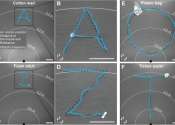Critical Thunderbolt flaw enables five-minute stealth attack
A new attack method affecting Thunderbolt-equipped computers can bypass locks, password-protection and encryption on ports produced before 2019.
Hardware

A new attack method affecting Thunderbolt-equipped computers can bypass locks, password-protection and encryption on ports produced before 2019.
Robotics

Running is great exercise but not everyone feels great doing it. In hopes of boosting physical activity—and possibly creating a new mode of transportation—engineers at Stanford University are studying devices that people ...
Mar 25, 2020
1
207
Energy & Green Tech

While at the proof-of-concept stage, it shows enormous potential as a portable power supply in several practical applications including electric vehicles, phones and wearable technology.
Feb 17, 2020
0
950
Engineering

While perhaps not as iconic as the paper crane, the hypar origami with its sweeping opposing arcs and saddle shape has long been popular for artists working in the paper folding tradition.
Sep 17, 2019
1
349
Engineering

Wearable human-machine interfaces—devices that can collect and store important health information about the wearer, among other uses—have benefited from advances in electronics, materials and mechanical designs. But current ...
Aug 2, 2019
0
273
Robotics

Researchers at Stanford University have developed a new way of controlling autonomous cars that integrates prior driving experiences—a system that will help the cars perform more safely in extreme and unknown circumstances. ...
Mar 27, 2019
0
133
Computer Sciences

Living in a dynamic physical world, it's easy to forget how effortlessly we understand our surroundings. With minimal thought, we can figure out how scenes change and objects interact.
Nov 29, 2016
0
192
Engineering

Researchers have developed a technique to move objects around with a jet of wind. The new approach makes it possible to manipulate objects at a distance and could be integrated into robots to give machines ethereal fingers.
Apr 29, 2024
0
59
Robotics

A new robotic suction cup that can grasp rough, curved and heavy stone, has been developed by scientists at the University of Bristol. The team, based at Bristol Robotics Laboratory, studied the structures of octopus biological ...
Apr 18, 2024
0
23
Engineering

New research suggests that materials commonly overlooked in computer chip design actually play an important role in information processing, a discovery that could lead to faster and more efficient electronics.
Apr 4, 2024
0
35
Physics (Greek: physis – φύσις meaning "nature") is a natural science; it is the study of matter and its motion through spacetime and all that derives from these, such as energy and force. More broadly, it is the general analysis of nature, conducted in order to understand how the world and universe behave.
Physics is one of the oldest academic disciplines, perhaps the oldest through its inclusion of astronomy. Over the last two millennia, physics had been considered synonymous with philosophy, chemistry, and certain branches of mathematics and biology, but during the Scientific Revolution in the 16th century, it emerged to become a unique modern science in its own right. However, in some subject areas such as in mathematical physics and quantum chemistry, the boundaries of physics remain difficult to distinguish.
Physics is both significant and influential, in part because advances in its understanding have often translated into new technologies, but also because new ideas in physics often resonate with the other sciences, mathematics and philosophy.
For example, advances in the understanding of electromagnetism led directly to the development of new products which have dramatically transformed modern-day society (e.g., television, computers, and domestic appliances); advances in thermodynamics led to the development of motorized transport; and advances in mechanics inspired the development of calculus.
This text uses material from Wikipedia, licensed under CC BY-SA